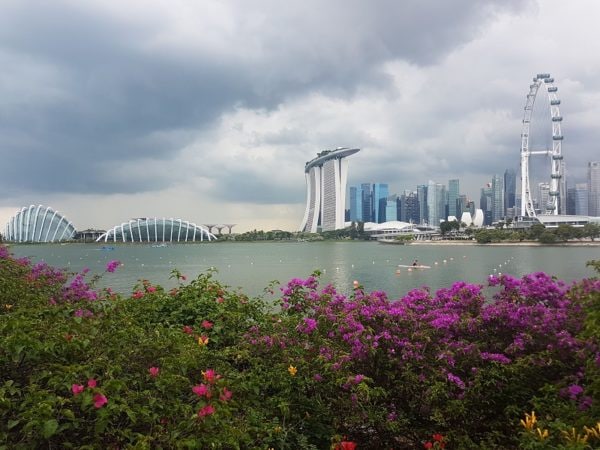
This article will take approximately 19 minutes to read. Don't have the time right now? No worries. Email the ad-free version of the article to yourself and read it later!
Wondering if you should hire a property agent in Singapore? Learn 2025 commission rates, buyer/tenant rules, HDB vs condo costs, and tips to find the best agent.
If you want to buy or rent a property in Singapore, you might want to consider hiring a real estate agent.
Hiring a real estate agent can help you find a property much more efficiently, but it’s going to cost you. Knowing the pros and cons of hiring a real estate agent can help you determine whether doing so is worth it for you.
In this guide, we’re going to provide you with all the information you need to know before hiring a real estate agent, including the benefits and drawbacks, the potential costs and requirements, and how to find a good agent.
All of the prices listed in this article are in Singapore Dollars (SGD).
Disclaimer: This article may include links to products or services offered by ExpatDen's partners, which give us commissions when you click on them. Although this may influence how they appear in the text, we only recommend solutions that we would use in your situation. Read more in our Advertising Disclosure.
Contents
- Advantages of Hiring a Real Estate Agent
- Disadvantages of Hiring a Real Estate Agent
- Property Agent Fees in Singapore in 2025
- Requirements
- What You Should Know Before Hiring a Real Estate Agent
- How to Find the Best Real Estate Agent in Singapore
- Working with a Real Estate Agent
- FAQs about Real Estate Agents in Singapore
- Now, on to You
Advantages of Hiring a Real Estate Agent
When you hire a real estate agent in Singapore, here’s what you get:
- expert advice
- ease of communication
- explanation of industry rules and regulations
- convenience
Let’s look at how each benefit will help you in your search for a home.
Expert Advice
One of the main benefits of hiring a real estate agent in Singapore is that they are experts in the local market. They know the best areas and properties that suit your specific needs, like knowing where the best schools are for your children.
If you’re new to the country, they can also offer expert advice about things like restaurants you should try, the best banks to open an account with, where to buy groceries, or even recommended dental clinics.
Since this helps them form a stronger, trusting relationship with you, they offer this type of advice for free. Having someone you can contact for advice when you move to a new country can help ease your transition.
Ease of Communication
If you’re looking for a property yourself, you’ll have to spend a lot of time contacting agents and owners to schedule viewings that suit both your schedules.
Not only is this time-consuming, but it can be challenging if you’re not familiar with Singlish — Singapore’s unofficial dialect — or any of the country’s official languages.
While English is one of the official languages, not everyone is fluent, so a real estate agent could also act as a translator for you when negotiating with local property owners.
Explanation of Industry Rules and Regulations
When renting or buying a place in your home country, you might not have needed a real estate agent if you were familiar with the local terms. Unfortunately, Singapore has its own rules and regulations that you must adhere to.
If you have a real estate agent, they can explain government regulations, leases, and any other industry terms you’re not familiar with to ensure you understand the entire process.
Convenience
Hiring a real estate agent also provides other conveniences, which is really useful if you just moved to Singapore, as they’ll search for properties for you.
If you’re buying or renting, they may provide a list of properties that suit your exact requirements so you can view them on your own time. This saves you from endless searches through property listings just to find the perfect place.
Also, many agents even have access to listings that aren’t public yet, so you have first dibs on viewing these listings.
They typically attend viewings with you and may even drive you to each property so you don’t have to spend money on the MRT or get all sweaty walking around in Singapore’s scorching heat, making the experience more efficient.
When you’re ready to buy or rent, they can handle negotiations, and all the necessary paperwork, so the only thing you have to do is show up and sign.
Disadvantages of Hiring a Real Estate Agent
Although you reap plenty of benefits when hiring a real estate agent, there’s one disadvantage as well.
The main disadvantage is that it’s an additional fee on top of your rent or mortgage. You must pay your real estate agent a commission fee for their time once they help you find your property. So, if you’re on a budget, it may not be the best option for you.
Property Agent Fees in Singapore in 2025
Unfortunately, there are no industry-standard commission rates in Singapore, so knowing exactly how much you’ll pay for an agent is tough. You can typically negotiate a commission fee with your agent, but it’s based on their expertise, the complexity of the deal, and how quickly you want to find a property.
Here are some common commission rates based on different renting and buying situations:
Buying a Non-Landed Private Property
When buying a non-landed private property, like a condo, you generally don’t pay a commission fee directly. Instead, the seller pays around 2% to 4% to their agent, and the seller’s agent may share part of their commission with your agent.
However, in recent years, it’s becoming more common for buyer’s agents to charge buyers 0.5% to 1% of the purchase price, especially if there’s no co-broking arrangement.
Buying a HDB Resale
When buying a Housing and Development Board (HDB) resale, you may pay your agent up to 1% (seller pay 2%). Please note that buying an HDB is only limited to permanent residents and Singaporeans.
Renting for 2 Years
When renting a private residence or HDB for two years, the typical commission is one month’s rent, split between the landlord’s and tenant’s agents.
In many cases, if the monthly rent is higher (above S$3,500 to S$6,000), the landlord’s side may cover most or all of the fee. But if you have your own agent, you should be prepared to pay up to one month’s rent.
Renting for 1 Year
When renting for just one year, the standard is half a month’s rent paid to your agent.
Renting for Less Than 1 Year
For short-term leases under a year, some agents may not want to represent you because the commission is too small, and you may be better off with a serviced apartment.
Requirements
Real estate agents may have requirements to ensure they can find you a property that you’re eligible for. Here are some of the main requirements they may ask you about before agreeing to represent you.
Budget
The first thing a real estate agent may ask you about is your budget for buying or renting a property.
As commission rates are normally based on your mortgage or monthly rent, experienced agents may decline you if you have a low budget, but there are always newer agents who want to gain new clients.
Agents may also consider the amount you earn each month to see if they can find you a property you can afford.
Visas
To rent property in Singapore as an expat, you must be legally able to reside in the country. This means you need a valid visa, such as an Employment Pass, S Pass, or Student Pass.
Your visa must have a validity period of at least six months at the date of application to rent.
You can also buy property if you’re in Singapore on a visa, but as an expat, you’ll be subject to a 60% additional buyer’s stamp duty fee on top of the original buyer’s stamp duty, which ranges from 1-6% depending on the type of property and the price.
Agents will assess your situation and determine whether you’re eligible to buy or rent property before agreeing to represent you.
Rental Duration
While short-term rentals (a lease that’s six months or less) may be available in Singapore, most agents won’t agree to represent you for such a short-term period.
This is because their commission will be lower, and they may have a hard time finding an owner who agrees to a short-term lease.
Some agents may not even agree to represent you if you only want to rent for a year rather than two, so you may have to search for property on your own and start shopping around for real estate agents.
For short-term rentals, it’s often better to find a serviced apartment.
Location
Although Singapore is a small country, it still has many unique neighborhoods.
Some agents may specialize in a certain area of Singapore, such as the Central Business District (CBD), and only want to represent clients interested in their area of expertise.
Start by searching for agents near you and meeting with them to discuss areas you’re interested in. If they have listings in those areas, they may agree to represent you.
Move In Date
Although you may want to get ahead in your search, if you’re not already in Singapore, real estate agents may ignore your inquiries.
This is because the rental and housing market in Singapore is fast-paced. Agents may not have the property you’re interested in by the time you get to Singapore.
Try contacting agents a few weeks before your arrival or consider finding temporary lodging at first, such as at a hotel, to conduct your search when you arrive in Singapore.
I booked an Airbnb for my first month in Singapore but ended up finding an apartment I could move into within three days, so the whole process happened quickly.
What You Should Know Before Hiring a Real Estate Agent
Here are some things you should know before hiring a real estate agent in Singapore.
Licenses
Real estate agents In Singapore must be registered with the Council Estate Agency (CEA) to legally offer their services. You can check if an agent you’re interested in working with is registered by visiting the CEA’s public register.
To conduct a search, you need the agent’s name, address, or phone number. You can also ask for their CEA registration number. If they’re hesitant to offer it, this may be because they’re not currently registered, so you should move on to another agent.
Only Hired Agents
Some countries have either independent agents who are self-employed or hired agents who work for an agency. Singapore only has hired agents.
This is because real estate agents must register themselves with the CEA through the real estate company they work for.
That being said, some real estate agents who want to work independently start their own agencies to do this.
Representative
In Singapore, real estate agents can’t represent both the buyer and seller because it would be a conflict of interest.

So, when you’re looking at property listings, you’ll notice they have an agent you can get in contact with to view the property. This is the selling agent. If you want to look for properties yourself, you can contact the selling agent to arrange a viewing. However, you may have to pay a selling agent for their time.
When I was looking for property on my own, I missed this note on the listing and had to pay a month’s rent to the selling agent despite finding the property on my own.
If you have a real estate agent, they’ll contact the selling agent directly for you, but you’ll only be responsible for paying your agent’s commission, and the seller will pay their agent’s commission unless otherwise noted on the listing.
Paying Your Own Agent
In Singapore, it’s about “paying your own agent” system. Sellers pay their agents, buyers pay their agents, landlords pay their agents, and tenants pay their agents. While this isn’t a law, it’s becoming more common practice, so you should ask your agent how they charge before working together.
Communicating with Real Estate Agents
You can typically contact real estate agents through property listing websites.
For example, Property Guru, one of the most popular listing sites, allows you to input your name, phone number, and email address so agents can get in touch with you.
Many agents also list their phone numbers or emails online so you can contact them yourself.
Most people in Singapore, including agents, use WhatsApp to communicate, so you won’t even need a local sim card for initial conversations.
However, you may be talking to your agent or property owners a lot, so having a local SIM card can help you facilitate phone calls.
Specificity
When meeting with real estate agents, it’s important to be upfront and specific about what you want. This allows agents to find a property that suits your wants and needs.
Here’s a list of information to prepare before you meet an agent:
- budget in SGD
- preferred location (if you don’t know yet, you can tell the agent what you want to be close to, such as an MRT or bus station or your work or school)
- preferred size
- ideal move-in date
- any facilities you need, such as a gym or swimming pool
- if you have any pets, let the agent know, as many property owners have strict rules against having pets
- any other conditions you have, such as included utilities if you’re renting or 24/7 security
How to Find the Best Real Estate Agent in Singapore
Here are the steps you can follow to find an agent in Singapore.
Look Online
Start your search online by looking through agent listings on popular property websites and portals. Here are our top five choices:
On these websites, you can look through agent directories. You may also be able to find a biography, reviews, any listings the agent has, and their specialties.
Review Credentials
When you find a few agents you like, you can check the CEA’s public register to ensure they’re licensed.
Websites like Property Guru display agents’ CEA registration numbers, so double-checking their license should be quick.
Check Websites and Portfolios
If there’s not a lot of information about the agent on the property website you’re on, try searching the agent’s name to see if he or she has a website.
This can help you learn more about agents and the agency they work for to see if they specialize in the area of real estate you’re interested in, like renting a condo or buying an HDB.
You may also contact agents directly and ask for a copy of their portfolio. This can help you assess their sales history and determine how successful they’ve been with helping clients in the past.
Read Reviews or Testimonials
To learn more about agents’ success rates, try reading reviews or testimonials about them.
They may feature positive reviews on their website, but for a more honest answer, try searching the agents’ names + review or customer testimonials.
If agents have a lot of negative reviews, you know they’re not the best choice for you.
Consider Commission Rates
Another way to narrow down your choices is to consider agents’ commission rates. This may vary depending on your needs, but you can ask for a general rate.

This can help you determine whether the agent’s fee is within your budget. Just remember that you get what you pay for, as industry experts may charge higher rates.
Meet with the Agent
When you’ve shortlisted a few agents, schedule a meeting with them to discuss your requirements and determine whether you have chemistry.
As you’ll be spending a lot of time together, and you want your real estate agent to have your best interests in mind, it’s important to form a strong professional relationship with them.
Suggest meeting for coffee or a quick meal at a hawker center to assess your compatibility.
Working with a Real Estate Agent
Once you have a real estate agent, here’s the process you may go through to find a property:
- Send your requirements to the agent
- The agent assesses your requirements and finds a few properties that meet your needs
- The agent sends you a list of properties for you to assess
- When you find a property you like from the list, the agent schedules a viewing for you (if you like multiple properties, the agent may be able to schedule all your viewings on the same day)
- The agent meets you at the property, sometimes with the selling agent, and goes on a tour of it with you
- If you like a property, you and the agent prepare a formal offer for the owner
- If the owner agrees, the buying and selling agent prepare a lease that you and the property owner both sign
- Then, you can move in on the date stated on the lease
FAQs about Real Estate Agents in Singapore
Here’re some frequently asked questions about using a real estate agent in Singapore.
How much do property agents charge in Singapore?
From my experience, most sellers pay between 2% and 4% of the property price to their agent. If you’re a buyer, you usually don’t pay anything for a condo, but lately I’ve noticed some buyer’s agents asking for 0.5% to 1%. For rentals, the norm is one month’s rent for a two-year lease or half a month’s rent for a one-year lease.
Just remember to ask if the commission includes GST because I’ve seen people get surprised by that extra 9%.
Do buyers pay commission in Singapore?
When I was looking at condos, I didn’t have to pay commission since the seller covered it. But things are changing, and some buyer’s agents now do charge. It’s not a huge amount (usually 0.5% to 1%), but it’s something to keep in mind. If you’re buying an HDB resale flat, then yes, buyers may pay up to 1% to their agent.
Is hiring a property agent in Singapore worth it?
Honestly, I think it depends on how comfortable you are with the market. When I first moved here, having an agent saved me a lot of time and stress. They handled calls, set up viewings, and explained contracts I would have been lost with. But if you’re confident, know the neighborhoods, and don’t mind doing the legwork, you can save the commission by going solo.
Can foreigners buy HDB in Singapore?
No, HDB flats are only for Singapore citizens and permanent residents. As a foreigner, your option is private property, like condos. Just be ready for the Additional Buyer’s Stamp Duty (ABSD). At the moment, that’s 60% on top of the regular stamp duty, which makes HDB off-limits and private condos pretty pricey for expats.
Now, on to You
Using a real estate agent in Singapore is completely up to you, but it may be a good idea.
It can save you time and help you find your dream property, which is especially beneficial if you’re purchasing rather than just renting.
Just remember that you’ll likely have to pay for this service, so consider your budget before making any decisions.
Disclaimer: This article is written based on my experience renting a property in Singapore for informational purposes. Commission practices can change. Always confirm with your agent or CEA.”








